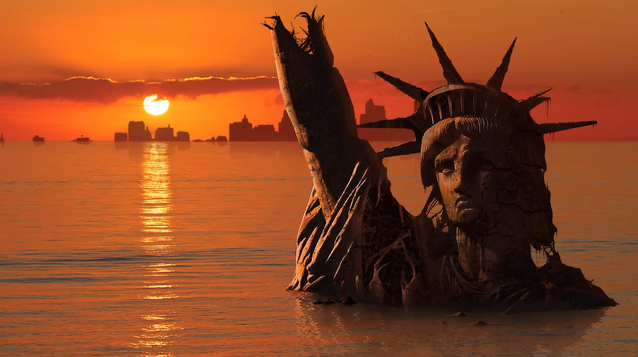
Alarm Bells Rising About Pending Climate Collapse
Two major reports released in late 2018 brought climate disruption to the forefront. For many people who previously had only passing concerns about the climate, the reports are unequivocal how climate disruption is a clear and present danger. The Fourth National Climate Assessment_2018 by the National Oceanographic & Atmospheric Administration, and the United Nations IPCC Special Report on Global Warming of 1.5 °C both reaffirm the science, and both reinforce each other’s conclusion that we have until 2030 to reverse global emissions and warming, before we face runaway climate collapse.
A single report might be easily ignored by deniers of climate trends and the scientific validity behind it, but two reports that present compelling data in detail are hard to dismiss. And now there is a third such report, released in May of this year, that presents a 2050 scenario “with dire implications, absent a fundamental change in human behaviour”.
The Melbourne, Australia based think tank, the Breakthrough National Centre for Climate Restoration, has concluded that the IPCC and the NOAA reports both are too optimistic. The report, Existential Climate Related Security Risks, projects that climate disruption “now represents a near- to mid-term existential threat to human civilization”, with a high liklihood of societal collapse as soon as 2050, if serious mitigation actions aren’t taken in the next decade. The new analysis is written by David Spratt, Breakthrough’s research director, and Ian Dunlop, a former senior executive of Royal Dutch Shell who previously chaired the Australian Coal Association. It is also endorsed by retired Admiral and former Chief of the Australian Defence Force, Chris Barrie.

NBC news explained how the Spratt-Dunlap analysis reached more dire conclusions. “The current climate crisis is larger and more complex than humans have ever dealt with before. Studies such as the UN IPCC report fail to account for the sheer complexity of Earth’s many interlinked geological processes. As such, they fail to adequately predict the scale of the potential consequences.”
The collapse scenario “begins with world governments ignoring the advice of scientists, resulting in a global temperature increase 5.4 F (3 C) by the year 2050. At that point, the world’s ice sheets vanish; brutal droughts kill many of the trees in the Amazon rainforest (removing one of the world’s largest carbon offsets); and the planet plunges into a feedback loop of ever-hotter, ever-deadlier conditions” – Civilization could crumble by 2050 if we don’t stop climate change now. Billions would suffer water scarcity, food production would suffer dramatically worldwide, and nation-states like the US and China would unravel.
Admiral Chris Barrie relates in the study’s introduction “This policy paper looks at the existential climate-related security risk through a scenario set thirty years into the future, painting a disturbing picture of the real possibility that human life on earth may be on the way to extinction, in the most horrible way. A doomsday future is not inevitable! But without immediate drastic action our prospects are poor. We must act collectively. We need strong, determined leadership in government, in business and in our communities to ensure a sustainable future for humankind – Can we think in new ways about the Existential Climate Risks?. The report states that the only way to avoid such a collapse is “akin in scale to the World War II emergency mobilization” focused on rapidly building out a zero-emissions industrial system – ‘Social Breakdown and Outright Chaos’: Civilization Headed for Collapse by 2050, New Climate Report Warns.

Recent Comments